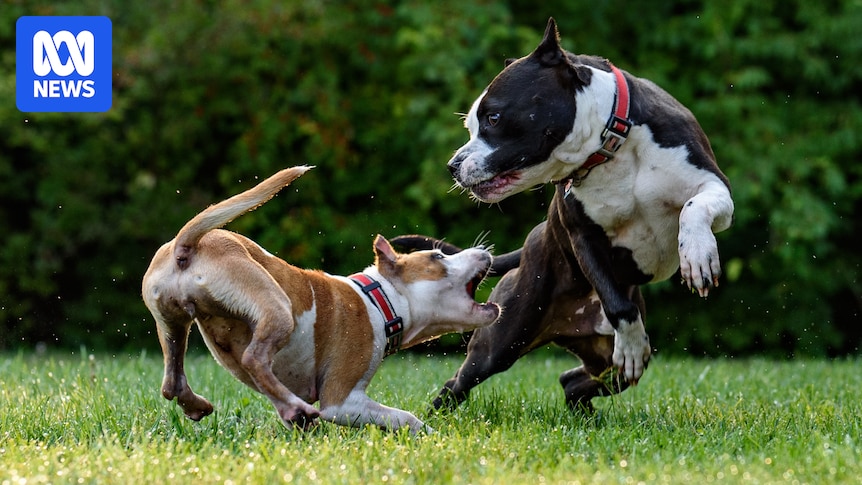As a Hunter Valley community reels in the wake of a fatal dog attack, the state’s “outdated” dog ownership laws remain under review.
Annalyse Blyton, 17, died in hospital four days after being mauled by a dog in a friend’s yard at Singleton earlier this month.
A review of the state’s Companion Animals Act began with the release of a discussion paper in February, prompted by inquests into three separate fatal attacks over the past five years.
Emma Hurst says she does not want to see the review “dragged out”. (ABC News: Monish Nand)
Animal Justice Party MP Emma Hurst said it was likely the review would consider “substantial changes”.
“There hasn’t been a major review of the act for over two decades,” she said.
“We don’t want to see this review dragged out, especially given how outdated the act is and the serious issues involved, and we encourage the minister to ensure the legislation reaches parliament as soon as possible.”
Ms Hurst called for it to be made illegal for people outside of the police force or other relevant authorities to train a dog to be dangerous.
“While it may not be related to this tragic incident, in NSW it remains legal for members of the community to train dogs to be guard dogs or to attack people,” she said in a statement.
An American Staffordshire Terrier mauled a baby on the Central Coast. (Flickr: Corinne Benavides, CC BY-NC 2.0/file photo)
Data from the Office of Local Government shows there were 3,285 dog attacks on people across New South Wales in 2024.
A review of the data showed the state’s worst trouble spot for dog attacks was Blacktown City Council in western Sydney.
The data also reveals the breeds most commonly involved in attacks.
The breed of a dog that fatally mauled a newborn boy on the NSW Central Coast in 2021 — the American Staffordshire terrier — ranks the highest in the state, responsible for 941 attacks on people and animals.
The bull terrier (Staffordshire) is second at 360, followed by the German shepherd at 346.
The data does not list the mixed breed that fatally mauled Ms Blyton in the Hunter Valley last week.
Singleton is not known for a high number of dog attacks, with just 36 reported in 2024.
More research needed
Animal behaviourist Melissa Starling said there was no single reason why some breeds appeared more aggressive on paper than others.
“There are a lots of factors that might come into the reason why [a dog] could be not be a safe family pet,” she said.
“What we really need to appreciate is that this kind of aggression doesn’t come from the breed itself, it comes from a lot of different factors, including how the animal’s raised.”
Melissa Starling says more research is needed on aggressive dog behaviour. (Supplied: Melissa Starling)
Dr Starling said the way dogs were socialised and the home environment they were raised in were key factors in the way dogs interacted with people.
She has called for more studies into dog behaviour.
“What I would really love to see is some more research into [aggressive dog behaviour] so that we can understand what’s happening and why,” Dr Starling said.
“If we were to ban every dog breed that’s ever caused a problem, we would have a lot of dog breeds that aren’t really a problem … that people can’t own anymore.”Thousands of submissions
Deputy State Coroner Carmel Forbes, who presided over the three inquests that prompted the review, handed down multiple recommendations, including stricter fines for unregistered dogs, licences for certain breeds and minimum safety standards for dog enclosures.
Submissions to the Companion Animals Act review closed in May.
Office of Local Government deputy secretary Brett Whitworth told a budget estimates inquiry last week that around 3,600 submissions had been received and would be released to the public shortly.
“We’re very much at the point of trying to pull together the key themes, the reforms and the next steps of action,” he said.
NSW Minister for Local Government Ron Hoenig released a statement earlier this week extending his condolences to Annalyse Blyton’s family.
He said NSW had “strong dog control laws” and was “reviewing the Companion Animals Act 1998 alongside recommendations from recent coronial inquests into fatal dog attacks in NSW”.
A spokesperson from the Office of Local Government told the ABC in a statement that the tragedy at Singleton highlighted “the importance of reviewing the NSW government’s approach to the management of dogs in communities, including the regulatory framework and obligations of dog owners”.
The review, which is the first of its kind in NSW for more than 20 years, is expected to be finalised in late 2026.

